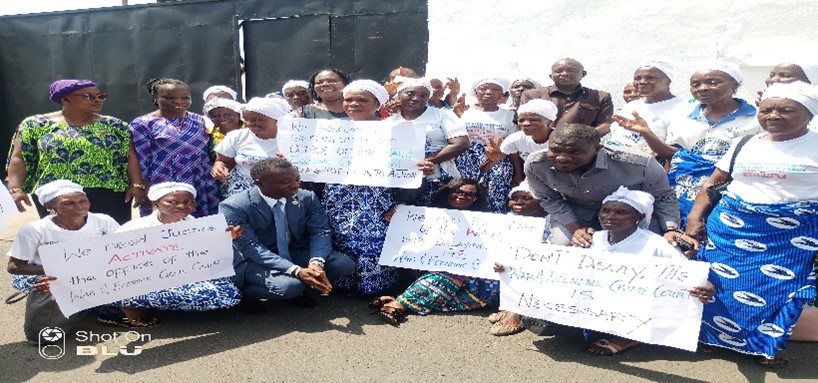The specter of Liberia’s brutal civil wars continues to haunt the nation, with the establishment of a War and Economic Crimes Court (WECC) remaining a contentious issue. In March 2025, a group of Liberian women, united under the banner of the Women in Peacebuilding Network (WIPNET), staged a peaceful protest at the WECC office in Monrovia. Their message was clear: they demanded decisive action from President Joseph N. Boakai’s government to fully form and fund the court, ending the prevailing culture of impunity. The protest, they explained, followed a series of meetings with government officials, where their concerns about the WECC’s delayed implementation were seemingly ignored. The women expressed growing anxieties about the country’s stability, citing student protests and general unrest as warning signs. They emphasized the urgency of the situation, demanding concrete action beyond vague promises of future progress.
Cllr. Jallah A. Barbu, Executive Director of the WECC office, addressed the protesters, acknowledging the government’s commitment to bringing perpetrators of heinous crimes to justice. While admitting the challenges, he assured the women that significant progress was being made. Barbu outlined a roadmap towards the court’s operationalization, promising the commencement of initial interviews by 2027. He attributed this timeline to detailed planning, internal calculations, and a strong political will within the government. Barbu emphasized that while the government might not be currently providing all necessary resources, their commitment to the process remained steadfast.
Despite these assurances, significant obstacles remain. Funding for the WECC poses a major challenge, exacerbated by the cessation of international aid from the United States and a general donor fatigue. This financial constraint casts a shadow over the court’s viability and the government’s ability to meet its proposed timeline. Furthermore, the complex political landscape complicates the pursuit of justice. The recent death of Senator Prince Yormie Johnson, a former warlord vehemently opposed to the court’s formation, removes a powerful voice of resistance, but underlying tensions and potential political maneuvering remain.
The women of WIPNET, however, stand firm in their demand for justice. Recognizing the interconnectedness of peace and accountability, they see the WECC as a crucial step towards healing Liberia’s deep wounds. They argue that a functioning court would not only punish perpetrators but also send a powerful message that impunity will no longer be tolerated. Their protest highlights the enduring impact of the civil wars on Liberian society, particularly for women who often bear the brunt of conflict. The women’s plea for action underscores the need for a comprehensive approach to peacebuilding that includes justice, reconciliation, and a commitment to addressing the root causes of conflict.
The international community plays a crucial role in supporting Liberia’s pursuit of justice and accountability. Renewed financial and technical assistance is vital to ensuring the WECC’s effective operation. Donor countries and international organizations must prioritize funding for the court, recognizing its importance for long-term stability and peace in Liberia. Beyond financial support, the international community can provide technical expertise in areas such as investigative procedures, witness protection, and legal frameworks for prosecuting war crimes and economic crimes. This collaborative effort is essential for overcoming the challenges and ensuring that the WECC can fulfill its mandate.
The establishment of the WECC represents a pivotal moment for Liberia. It offers an opportunity to break the cycle of impunity and build a more just and peaceful society. The women’s protest serves as a powerful reminder of the importance of holding perpetrators accountable and ensuring that victims have access to justice. The road ahead is undoubtedly challenging, but with sustained commitment from the government, support from the international community, and the unwavering advocacy of groups like WIPNET, Liberia can move closer to a future where justice and accountability prevail. The successful operation of the WECC will not only address past atrocities but also contribute to preventing future conflicts and fostering lasting peace.














